DREAMS OF RUGBY OP-ED
The significance (or not) of our Springbok victory for nation building and democracy — Part Two
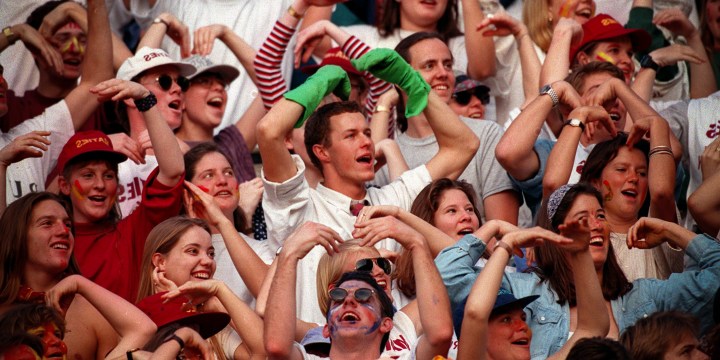
My sense is that many people see the Rugby World Cup victory as pointing towards a broader regeneration of society and democracy, towards the realisation of goals aspired to in 1994, and have been set back in the last decade or more, of the Zuma and Ramaphosa presidencies.
Read Part One here.
When I got to university, one of the highlights of the year was the InterVarsity rugby match between UCT and Stellenbosch. By that time, I was fairly politically aware, having grown up as a liberal, my parents having been founder members of the Progressive Party, and at UCT, there were a very limited number of black students (meaning Africans, Coloureds and Indians), and they were obviously very aware of segregation.
One of the targets of people who were anti segregation was the annual InterVarsity between UCT and Stellenbosch. One year we would go to Stellenbosch and one year they would come to UCT. My recollection is that the UCT home ground for InterVarsity was Newlands.
Among the circle in which I discussed politics, the idea of boycotting InterVarsity gained ground and some people who pledged themselves to boycott InterVarsity did not carry it out or did carry it out initially, but lapsed.
I carried it out throughout my period as a student at UCT. This has been part of my political consciousness, that I have not undertaken what I would not carry out. While that is an ethical consciousness, it can also be rigid and that may explain why in the years that followed, I continued to boycott apartheid rugby and cricket and sports.
But even now, when there is no ethical reason against watching rugby, when we have non-racial sports, it’s hard for me to adapt and break a de facto boycott.
Read more in Daily Maverick: South Africa’s Rugby World Cup heroes – from dark horses to the GOAT
It should be mentioned that in the period that followed my studying and teaching at UCT until late 1969, the Anti-Apartheid Movement in Britain, and later New Zealand, developed effective campaigns to disrupt Springbok rugby tours. Although I was in the UK at the inception of the campaign, I stayed away because I was en route to leaving my studies and working as an underground operative.
Later, when I was in prison from the mid-seventies, the Springbok tour of New Zealand was extensively disrupted. We had no access to newspapers but could sense that something “terrible” had happened (from the point of view of the warders) because of the aggressive way they opened our doors and addressed us.
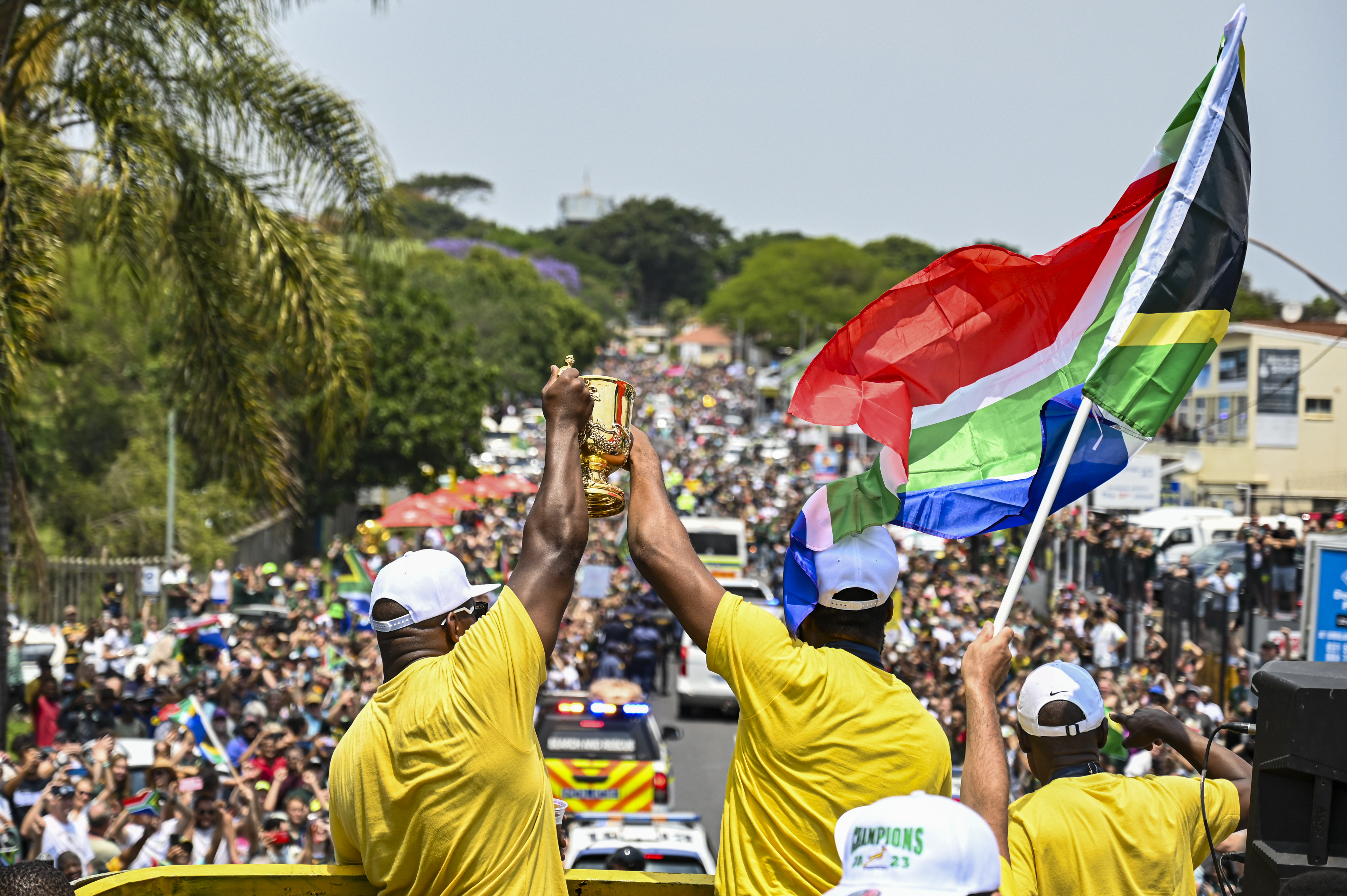
Players and fans during the Bok national trophy tour on 4 November 2023 in Durban. (Photo: Darren Stewart/Gallo Images)
RWC 2023 and its significance
Obviously, many people are very happy about the Springboks winning the World Cup and as indicated, it has evoked widespread joy and a sense of a previously divided people belonging to one another.
Without having studied this carefully, the high-profile presence and leading players being black did not happen by chance, but involved careful work by coaches Rassie Erasmus and Jacques Nienaber. The victory resulted to a significant extent from conscious focussing on “spotting” potential rugby stars in the black communities from under-15 level, and enhancing their talents through a rugby academy established by Erasmus.
That is why one has a black rugby captain and black players as leading members of the team. It may have coincided with making the team more representative of the population as a whole, but according to Erasmus, the black captain and players were not specifically intended as a contribution to this spirit. It is the result of the academy and improving opportunities. Erasmus maintains every player, and the captain, were chosen on merit. Even if not intended, it has had political effects, as Mondli Makhanya summarises:
“Much has been said about the leadership of Rassie Erasmus, Siya Kolisi and the rest of the technical team. Yes, leadership matters tons but that does not tell the whole story.
“The sense of purpose prevails among all members of the team, and you can feel that when they are wearing that jersey – it is more than just about playing a game of rugby. It is about national duty…
“And so we find ourselves in an era when a symbol that black people were prohibited from wearing and that they in turn reviled, is now the most potent sense of pride for all.
“And we find a sport that was regarded as ‘the Afrikaner’s second religion’ is now the one that glues the nation together.” (– Mondli Makhanya: “From symbol of apartheid to glue of the nation.” City Press, 5 November 2023.)
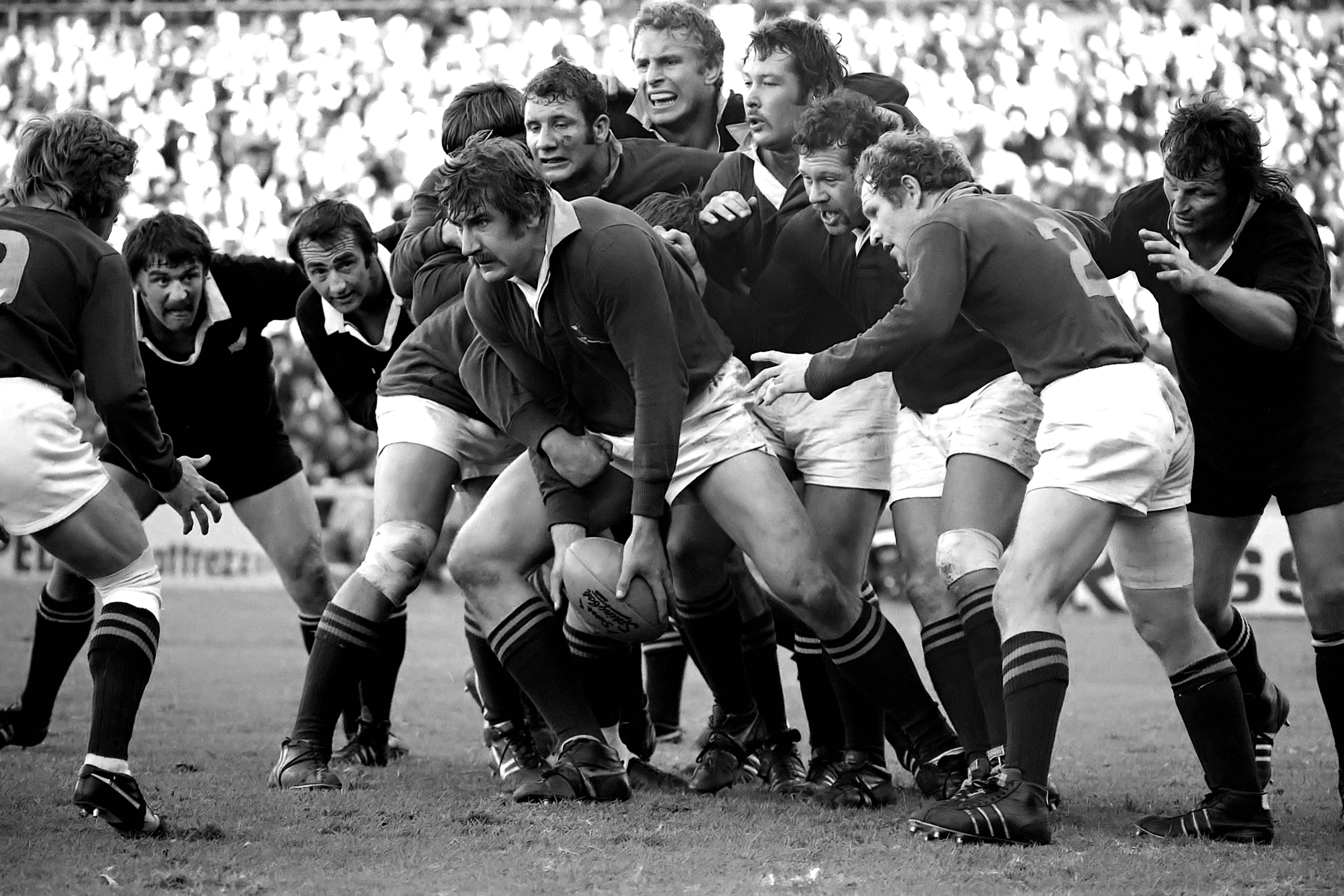
Kevin de Klerk, Moaner van Heerden, Johan Strauss, Piston van Wyk and Piet Kruger of the Springboks, with Andy Leslie of the 1976 All Blacks playing in South Africa in 1970. (Photo: Wessel Oosthuizen/Gallo Images)
What does the victory mean in terms of overall transformation of SA?
Having spent so many years where rugby was anathema and many of the sports players were apolitical or de facto supporters of apartheid, it has been hard for me to get excited about the Rugby World Cup.
And in fact, when I read the praise of the Springboks and what the Rugby World Cup is alleged to have done in evoking hopes for the future of South Africa, I had the sense that many of these statements are rather fanciful and far-fetched exaggerations (see also JM Coetzee on the 1995 Rugby World Cup victory).
But that is not to suggest that the level of unity it evoked cannot be built on, given the right conditions.
What does it do in terms of politicisation of the population, about the continuation of racism, institutionalised racism, inequality, and many other things, after the celebrations have cooled down?
Obviously the captain of the Springbok rugby team, Siya Kolisi, is an excellent leader beyond the rugby field, understanding the context of division within which this unifying victory occurs. That is something that we need in the country, unity and also awareness of difficulties, if we want to consolidate this victory into more substantial nation-building.
We need to keep our emotions in train and not read more into this victory than it can immediately bear. That is not to say that it cannot become a significant part of the basis for a broader, more far-reaching unifying process.
Political endorsement
I did understand after the event why Nelson Mandela wore the Springbok rugby jersey after the Springboks won their first World Cup in 1995. It was part of his attempts to build a new South African nation, where all who live in it belong to that nation. I believe he had foresight, although at the time I was a little disquieted by the extent to which he went with this reconciliation.
In retrospect, I do believe that in principle he was correct. Likewise, I see it as part of a process of trying to secure the peace enunciated in the negotiated settlement, and to rebuild the South African nation as one embracing all.
Whether that remains correct in the present period, whether the celebrations and commentaries on the victory are not exaggerating what has been achieved and what it foreshadows, needs constructive debate.
My sense, however, is that many people see the victory in the Rugby World Cup as pointing towards a broader regeneration of South African society and democracy, towards the realisation of many goals, goals that were aspired to in 1994 and have been set back in the last decade or more of the Jacob Zuma and Cyril Ramaphosa presidencies.
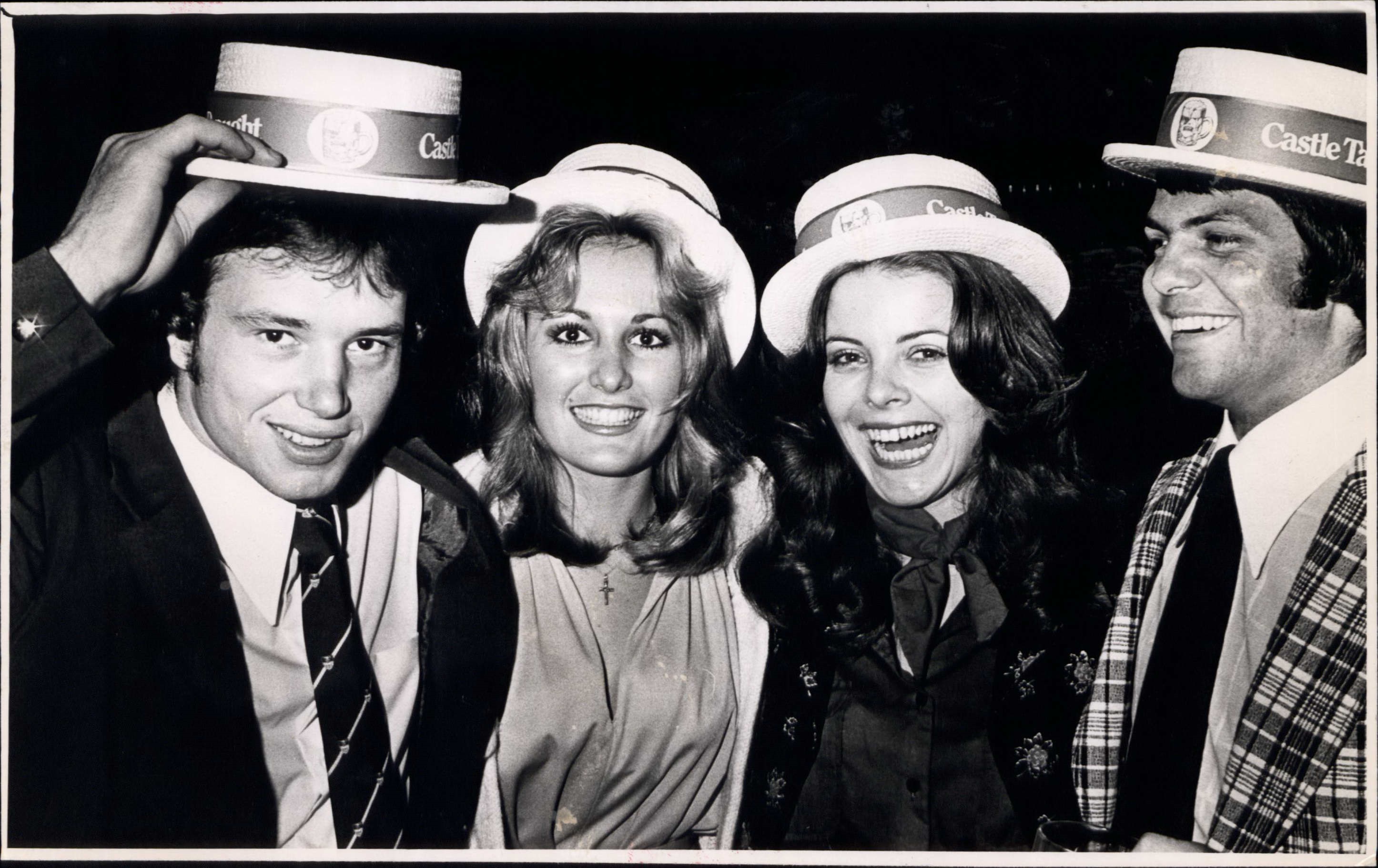
An archival image of a student InterVarsity at the University of Stellenbosch. (Photo: Gallo Images/Die Burger)
Moment of unity
I do concede that the moment of unity, in the context of a victory in rugby, is socially and politically important. But one cannot guarantee that it will be taken further in the period that follows in ways that some people are suggesting.
It is not given that it will be a prelude to the resolution of our country’s problems on the basis of the goodwill and amity and cohesion that was temporarily manifested in the wake of this victory.
I am saying temporarily, not because I’m mocking the moment of unity, but because although people suggest that it can be enduring, there is no reason to suggest that it can automatically be enduring, and what type of enduring quality will be manifested, if at all?
Read more in Daily Maverick: Never give up, Never say die — a love letter to our country after ‘that RWC game’
What we saw with the rugby victory is that a country that longs for what is called “good news” got some good news, and it evoked joy not just among one section of the population, not just among one set of organisations, but over South African society as a whole.
There is a need for moments of unification and rugby victories may be a basis for unification, even if the basis is limited. Equally, that is not to suggest that it cannot be more than that. It depends on us and what we do with our own agency in transforming our society.
I hope that the spirit of this victory can infuse efforts to address the country’s problems, for us to realise equality, banish tensions between sections of the population, end unemployment, end hatred between peoples as found in xenophobia and other racism inside the country. I would like to see these as well as broader transformation in a number of spheres, including healthcare, education, and provision of basic needs such as water and electricity.
I would like to see all of these questions resolved or on a trajectory that is on the way to resolving them. Hopefully the spirit of joy and unity that the rugby victory evoked can contribute towards such resolution.
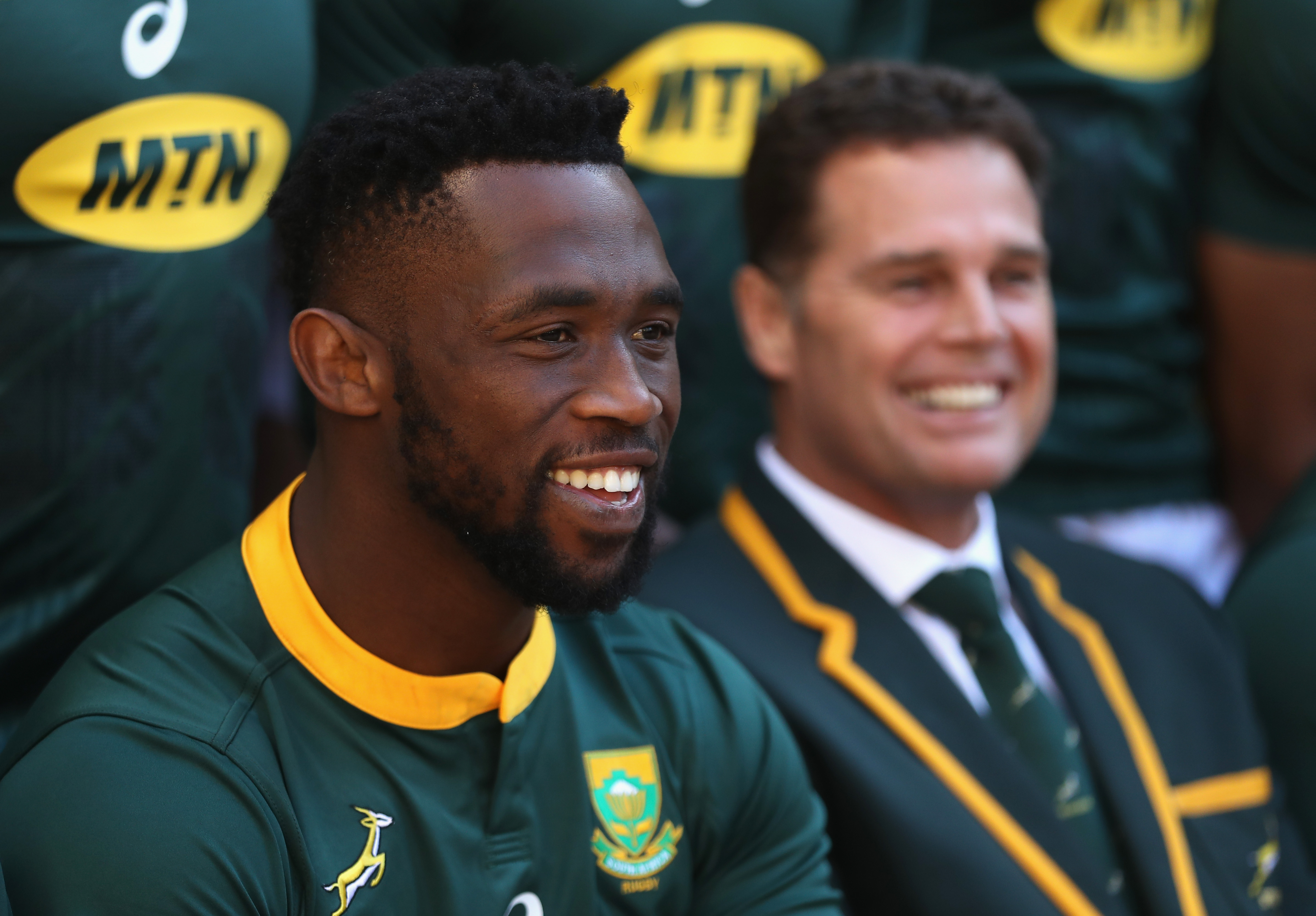
Siya Kolisi, captain of the Springboks with Director of Rugby Rassie Erasmus during a South Africa media session at the Pivot Hotel in June 2018 in South Africa. (Photo: David Rogers/Getty Images)
Requires more than rugby victory
For it to go further requires much more than a rugby victory. It requires a plan for transformation, for joining people together as one in social groups and organisations – but in organisations that are dedicated to ending lawlessness, violence, corruption, gender-based violence and dehumanisation of anyone in the country.
That dehumanisation is not simply attitudes of minds that can be displaced by joy. It’s also structural in that the dehumanisation – which leads to starvation and mothers killing their children and themselves because they have no way of alleviating their starvation – is part of the structural racism that continues in South Africa, of the structural inequality which was one of the products of apartheid that continues.
There’s nothing to suggest that questions like these can be altered by a sense of joy, much as the sense of joy also incorporates a sense that we belong together.
But if we belong together, and that belonging incorporates large-scale inequality, which entails dehumanisation and humiliation and deprivation of basic needs, then that belonging is very limited.
And I’m not saying that the moment of joy and victory was unimportant. I’m just saying that it was a moment and was not a set of circumstances that has built into it how it can become something more.
We need to join together, in a unity that is needed in any case, to ensure that it goes beyond this and is part of rebuilding our democratic life and acting against inequality. DM
This article first appeared on Creamer Media’s polity.org.za






 Become an Insider
Become an Insider
Julius summarized it for you. We were playing rugby here in Azania before Diaz was born.
Unity works,till politicians arrive
I wish that wasn’t true – but it is.
I wish that Cyril had waited just a moment before rushing into the centre of the group – but he didn’t.
Raymond Suttner raises some valid points, but he still sounds wounded by the past. His credentials are impeccable. It would be good to see a more positive injection from him into the messy political dialogue that is our current experience.